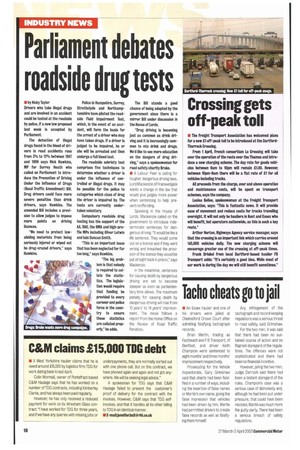Parliament debates roadside drug tests
Page 10

If you've noticed an error in this article please click here to report it so we can fix it.
is by Ricky Taylor
Drivers who take illegal drugs and are involved in an accident could be tested at the roadside by police, if a new law proposed last week is accepted by Parliament.
The detection of illegal drugs found in the blood of drivers in road accidents rose from 3% to 12% between 1987 and 1999 says Nick Hawkins, MP for Surrey Heath who called on Parliament to introduce the Prevention of Driving Under the Influence of Drugs (Road Traffic Amendment) Bill. Drug drivers could face more severe penalties than drink drivers, says Hawkins. The amended Bill includes a provision to allow judges to impose more points on driving licences.
"We need to protect lawabiding motorists from being seriously Injured or wiped out be drug-crazed drivers," says Hawkins. Police in Hampshire, Surrey, Strathclyde and Northamptonshire have piloted the roadside Field Impairment Test, which, in the event of an accident, will form the basis for the arrest of a driver who may have taken drugs. If a driver is judged to be impaired, he or she will be arrested and then undergo a full blood test.
The roadside sobriety test comprises five techniques to determine whether a driver is under the influence of controlled or illegal drugs. It may be possible for the police to categorise which class of drug tile driver is impaired by. The tests are currently undertaken voluntary.
Compulsory roadside drug testing has the support of the AA, RAC, the BMA and high-profile MPs including Oliver Letwin and lain Duncan Smith.
"This is an important issue that has been neglected for far too long," says Hawkins.
The big problem is that nobody is required to collate the statistics. The legislation would require that funding be provided to every coroner and police force in the country to ensure these statistics are collated properly," he adds.
The Bill stands a good chance of being adopted by the government since there is a mirror Bill under discussion in the House of Lords.
"Drug driving is becoming just as common as drink driving and It is increasingly common to mix drink and drugs. We'd like to see more education on the dangers of drug driving." says a spokeswoman for road safety charity Brake.
• A Laocur Peer is calling for tougher dangerous driving laws. Lord Mackenzie of Framwellgate wants a change in the law that would give judges more power when sentencing to help prevent reoffending.
Speaking in the House of Lords, Mackenzie called on the government to introduce indeterminate sentences for dangerous driving. it would be Ike a life sentence. They would come out on a licence and If they went wrong and breached the provision of the licence they would be put straight back in prison," says Mackenzie.
In the meantime, sentences for causing death by dangerous driving are set to become steeper as soon as parliamentary time allows. The maximum penalty for causing death by dangerous driving will rise from 10 years' to 14 years' Imprisonment. The move follows a report from the Home Office on the Review of Road Traffic Penalties.












































































































































































